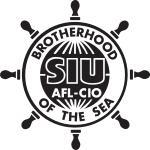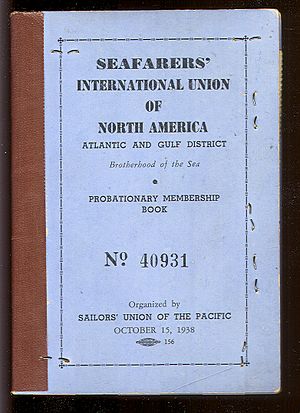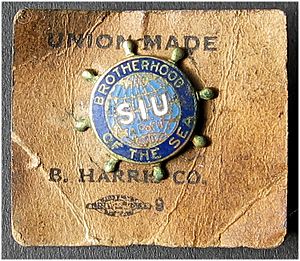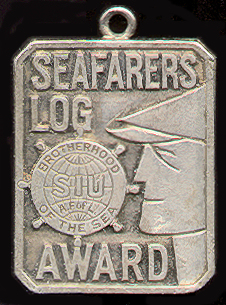Seafarers International Union of North America facts for kids
 |
|
| Founded | October 14, 1938 |
|---|---|
| Headquarters | Camp Springs, Maryland |
| Location | |
|
Members
|
35,498 (2005) |
|
Key people
|
David Heindel, president |

The Seafarers International Union or SIU is a group of 12 independent unions for people who work on ships. These include mariners, fishermen, and boatmen who work on vessels from the United States or Canada. The SIU started on October 14, 1938. It is the largest group for maritime workers in the United States, with about 35,498 members. David Heindel has been its president since 2023.
Today, the SIU helps mariners and boatmen who work on ships sailing in deep oceans, the Great Lakes, and rivers. Members work in different parts of a ship, like the deck, kitchen (steward), and engine rooms. SIU members can be found on many types of vessels. These include ships that support the military, commercial trade ships, tugboats, passenger ships, barges, and even gaming vessels. Many jobs for seafarers come from military support ships. These ships are run by the U.S. Department of Defense's Military Sealift Command (MSC). The MSC has about 110 non-fighting ships that help U.S. forces worldwide.
Being an SIU member means you can get important benefits. These include healthcare, retirement plans, and education. The union has its own school, the Paul Hall Center for Maritime Training and Education. It is located in Piney Point, Maryland. This training center started in Brooklyn, New York. It is named after Paul Hall, who was a past president of the SIU. The school opened in 1967 and has trained more than 100,000 mariners. The SIU also works hard in politics. It focuses on keeping workplaces safe for people on ships. It also makes sure its members have very high training standards.
Contents
History of the Seafarers Union
The Seafarers International Union began on October 14, 1938. This was a difficult time because of the Great Depression, a worldwide economic slowdown. The SIU's roots go back even further, to 1892. That year, leaders from unions on the West Coast, Gulf of Mexico, and Great Lakes met in Chicago. This meeting led to a group of maritime unions called the International Seamen's Union (ISU). It was part of the American Federation of Labor (AFL).
The SIU sees its beginning as coming from the "wreckage" of the ISU. The ISU lost many members, going from over 100,000 after World War I to less than 3,000 by the mid-1930s. In July 1937, the ISU lost its official status. Also, 30,000 seamen joined a new union called the National Maritime Union (NMU). This was part of the Congress of Industrial Organizations (CIO). These events showed that the ISU was ending.
The leaders of the AFL, one of the first big groups of labor unions, knew the ISU was about to fail. So, the AFL decided to create a new union. They gave permission to the Sailors Union of the Pacific (SUP) to start the new Seafarers International Union. Harry Lundeberg, a SUP officer and seaman from Norway, became the first president of the Seafarers International Union. The SUP stayed independent within the SIU for many years.
The AFL created the SIU for a few reasons. It helped stop the loss of seafaring jobs to the NMU. It also worked against the growing influence of the Communist Party in the rival CIO. The NMU was formed during tough economic times and strikes. It became a strong competitor to the SIU for a long time. The two unions fought hard for seafaring jobs until they joined together in 2001.
During World War II, the Seafarers International Union had fewer members than the National Maritime Union. Then, Paul Hall started organizing seamen on the East Coast and in the Gulf. By 1948, many new members joined, and Hall became the SIU vice president. This growth helped the SIU become stronger than the NMU. The NMU had become weaker after removing members who were part of or suspected of being part of the Communist Party. Also, Harry Lundeberg's death in 1957 ended a long power struggle between Lundeberg and Hall. Paul Hall then became the SIU president. Later that year, he also became president of the AFL–CIO Maritime Trades Department.
When Hall took over the Maritime Trades Department, it was a small group with only six unions. He worked hard to make it a strong and active political force in the union world. When he passed away, the Maritime Trades Department included 43 national and international unions. These unions represented almost 8 million American workers.
In 1967, Hall started the Seafarers Harry Lundeberg School of Seamanship in Piney Point, Maryland. He wanted to give young people a chance to have a career at sea. Since then, the school has become one of the best maritime training schools in the country. Thousands of SIU members have improved their skills there. The Harry Lundeberg School has also given opportunities for many young people from difficult backgrounds to find jobs. In the 1970s, the SIU became even stronger when it merged with the National Union of Marine Cooks and Stewards (NUMCS). Paul Hall passed away in 1980 after an eight-month battle with cancer.
Leaders of the SIU
Presidents of the Union
- Harry Lundeberg (1938–1957)
- Paul Hall (1957–1980)
- Frank Drozak (1980–1988)
- Michael Sacco (1988–2023)
- David Heindel (2023–present)
Secretary-Treasurers of the Union
- 1938: John Hawk
- 1971: Joseph DiGiorgio
- 1990: John Fay
- 1997: David Heindel
- 2023: Tom Orzechowski
Unions Working with SIU
The Seafarers International Union works with many other unions. In 2005, a report showed that all 13 unions working with SIU had a total of 35,498 members. Here are some of the unions that are part of the SIU family:
| Unions Connected to SIUNA | |||
| Connected Union | Total Members | More Info | |
|---|---|---|---|
| Seafarers International Union of North America Atlantic, Gulf, Lakes & Inland Waters District/National Maritime Union (http://www.seafarers.org) |
11,714 | 2005 Report | |
| American Maritime Officers (http://www.amo-union.org) | 3,921 | 2006 Report | |
| Fishermen's Union of America Pacific & Caribbean | 45 | 2005 Report | |
| Industrial, Professional, Technical Workers International Union | 1,064 | 2005 Report | |
| Marine Firemen's Union (http://www.mfoww.org/) | 802 | 2005 Report | |
| Sailors' Union of the Pacific(http://www.sailors.org) | 736 | 2005 Report | |
| Seafarers Entertainment and Allied Trades Union (http://www.seatu.org/xp/seatu/) | 3,421 | 2005 Report | |
| Seafarers International Union of Canada (http://www.seafarers.ca) | Unknown | Unknown | |
| Seafarers International Union of Puerto Rico, Caribbean and Latin America | 637 | 2005 Report | |
| Seafarers Maritime Union | 110 | 2005 Report | |
| Sugar Workers Union No. 1 | 332 | 2005 Report | |
| United Industrial, Service, Transportation, Professional and Government Workers of North America |
Unknown | Unknown | |
See also
- Paul Hall Center for Maritime Training and Education
- United States Merchant Marine
- Related organizations
- American Maritime Officers
- National Maritime Union
- Marine Engineers Benevolent Association
- Maritime Trades Department
- Sailors' Union of the Pacific
- Seafarers' International Union of Canada
 | Sharif Bey |
 | Hale Woodruff |
 | Richmond Barthé |
 | Purvis Young |



